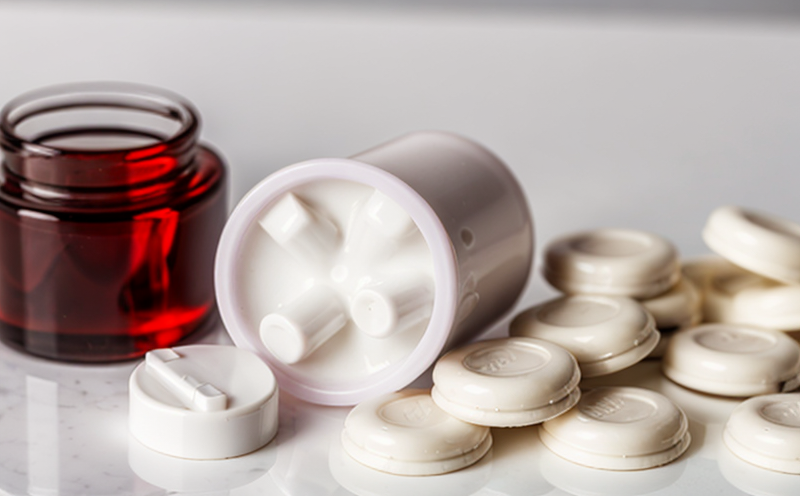USP Capsule Shell Extractables Testing
The integrity of pharmaceutical products is paramount in ensuring patient safety and efficacy. Among various testing protocols, USP Capsule Shell Extractables Testing plays a critical role in the quality assurance process for oral solid dosage forms such as tablets and capsules. This service ensures that any chemical compounds extracted from the capsule shell do not adversely affect drug stability or interfere with therapeutic efficacy.
The primary objective of this testing is to identify potentially harmful substances that may leach into the product during storage, handling, or under certain environmental conditions. The USP 1 specifies detailed procedures and acceptance criteria for determining extractables from capsule shells made of different materials such as gelatin, hypromellose (HPMC), and others.
The testing process involves extracting potential leachable substances using various solvents such as water, ethanol, methanol, or phosphate buffered saline. The extracted solutions are then analyzed using advanced analytical techniques like High-Performance Liquid Chromatography (HPLC), Gas Chromatography-Mass Spectrometry (GC-MS), and Infrared Spectroscopy (IR).
Compliance with USP standards is essential for pharmaceutical manufacturers to ensure their products meet regulatory requirements. This service supports the quality control process by providing detailed reports on extractables, which can be used for risk assessment, formulation optimization, and process validation.
- Water Soluble Extractables: These include compounds that are soluble in water and may affect drug stability over time or under certain conditions.
- Polar Organic Solvent Extractables: This category encompasses substances extracted using polar solvents like methanol, which can interact with the active pharmaceutical ingredients (APIs).
- Lipophilic Organic Solvent Extractables: These are compounds that dissolve in non-polar solvents and could potentially interfere with drug absorption.
The testing process is highly sensitive and involves meticulous sample preparation, ensuring accurate results. The analytical methods used must be validated to meet the precision and accuracy requirements specified by USP.
This service supports pharmaceutical manufacturers in meeting stringent regulatory standards, thereby enhancing product quality and patient safety. By identifying and quantifying extractables from capsule shells, this testing ensures that only safe materials are used in drug formulations.
Scope and Methodology
The scope of USP Capsule Shell Extractables Testing encompasses the evaluation of potential leachates from capsule shells under various test conditions. This includes the extraction of compounds using different solvents to simulate real-world scenarios such as storage in humid or dry environments.
The methodology involves several key steps:
- Sample Preparation: Capsule shells are selected based on their composition and type, then thoroughly cleaned before testing.
- Solvent Selection: Solvents like water, ethanol, methanol, or phosphate buffered saline are chosen to simulate different environmental conditions.
- Extraction: The capsule shell is immersed in the solvent for a specified duration under controlled conditions.
- Analytical Analysis: Extracted solutions are analyzed using HPLC, GC-MS, and IR to identify and quantify potential leachables.
- Data Interpretation: Results are compared against USP standards to determine compliance.
The methodology is designed to be robust and reproducible, ensuring consistent results across different batches of capsule shells. This service supports pharmaceutical manufacturers in meeting regulatory requirements by providing detailed reports on extractables.
Quality and Reliability Assurance
- Analytical Precision: The testing process is validated to ensure high precision, ensuring accurate results under different conditions.
- Environmental Controls: Tests are conducted in controlled environments to simulate real-world storage conditions accurately.
- Reproducibility: Multiple batches of capsule shells are tested to confirm consistency across samples.
- Compliance Verification: Results are compared against USP standards to ensure compliance with regulatory requirements.
The reliability of this testing process is further enhanced by using state-of-the-art analytical instruments and adhering strictly to standard operating procedures. This ensures that the results are consistent, reproducible, and reliable across different batches of capsule shells.
Quality assurance in this service involves meticulous sample preparation, rigorous analytical methods, and strict adherence to USP guidelines. The testing process is designed to provide accurate and actionable data for pharmaceutical manufacturers to optimize their formulations and processes.
Use Cases and Application Examples
The use cases for USP Capsule Shell Extractables Testing are wide-ranging, particularly in the development and quality assurance of oral solid dosage forms. This service is essential for ensuring that the materials used in capsule shells do not interact with or degrade the active pharmaceutical ingredients (APIs).
Use Case 1: Drug Stability Studies: By identifying potential extractables from capsule shells, this testing helps in assessing drug stability over time and under different environmental conditions.
Use Case 2: Process Validation: This service supports process validation by ensuring that the materials used in capsule shells are safe and do not interfere with the manufacturing process.
Use Case 3: Risk Assessment: Extractables testing helps pharmaceutical manufacturers identify potential risks associated with the use of certain materials in capsule shells, allowing for informed decision-making in formulation design.
Use Case 4: Regulatory Compliance: This service ensures compliance with USP standards and other relevant regulatory requirements, providing a competitive edge in the pharmaceutical industry.
In addition to these use cases, this testing is also beneficial for R&D engineers and quality managers who need detailed data on potential leachables from capsule shells. Procurement officers can also benefit by ensuring that only compliant materials are sourced for capsule shell production.





